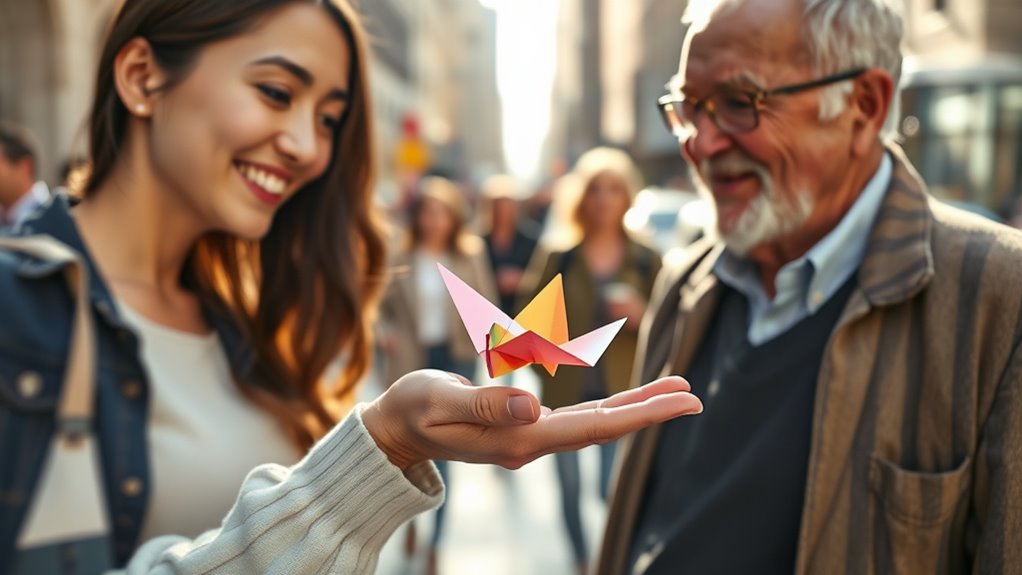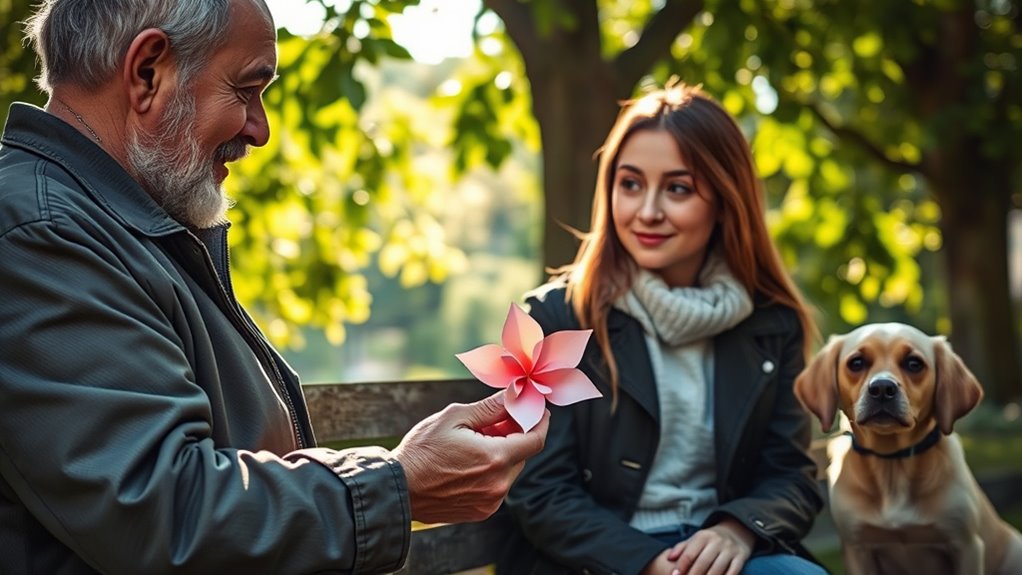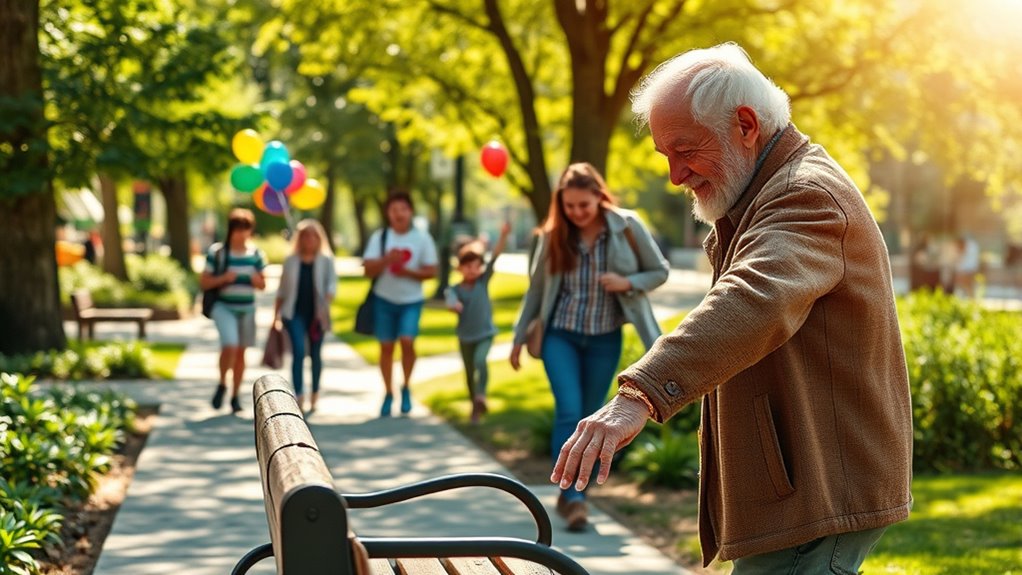To reduce cynicism, focus on everyday acts of kindness and genuine connection. Smile warmly, offer sincere compliments, and listen with full attention to show you care. Help others without expecting anything in return and express appreciation regularly. Small public acts like helping strangers or sharing gratitude boost positivity and trust. Consistently practicing these simple gestures can rebuild hope and trust. Keep going, and you’ll discover more ways to create a more hopeful, connected community.
Key Takeaways
- Engage in small, consistent acts of kindness like greeting neighbors to build trust and foster a positive community environment.
- Practice active listening and empathetic communication to deepen connections and reduce feelings of cynicism.
- Offer help or support unconditionally, demonstrating genuine care without expecting reciprocation, strengthening trust and bonds.
- Regularly express appreciation and perform public acts of kindness to promote optimism and counteract negative attitudes.
- Lead with authenticity and encouragement, inspiring others to adopt positive behaviors and cultivate a culture of trust.
The Power of a Genuine Smile

A genuine smile has the remarkable ability to instantly lift someone’s mood and create a sense of connection. When you share an authentic smile, you foster a genuine connection that goes beyond surface interactions. It signals warmth, openness, and sincerity, encouraging others to feel comfortable and valued. Your smile can break down barriers, making conversations more meaningful and authentic. People are naturally drawn to positivity, and your genuine smile serves as a powerful tool for fostering trust and understanding. By offering this simple gesture, you promote authentic interactions that can brighten someone’s day. Remember, a sincere smile is contagious—spreading kindness effortlessly and helping to diminish cynicism in everyday life. It’s a small act with a profound impact. Additionally, demonstrating emotional intelligence through kindness can deepen these connections and promote a more positive environment. Cultivating empathy allows us to better recognize and respond to others’ feelings, reinforcing the power of genuine gestures like a smile. Developing mindful awareness helps us to be more present and authentic in our interactions, making our gestures even more meaningful. Recognizing the importance of positive psychology can further enhance our understanding of how small acts like a smile influence overall well-being. Incorporating mindfulness techniques can heighten our sensitivity to others’ emotional states, making our genuine gestures even more impactful.
Small Acts That Make a Big Difference

Small acts, like holding the door or offering a sincere compliment, can brighten someone’s day and build trust over time. Random acts of kindness show others you care, even without expecting anything in return. When you make consistent small gestures, you create a ripple effect that can shift attitudes and reduce cynicism. Additionally, fostering empathy and digital etiquette helps nurture respectful online interactions and enhances overall well-being. Engaging in community involvement through simple acts can further strengthen social bonds and promote a more compassionate environment. Incorporating these evidence-based practices into daily life can make kindness more natural and sustainable. Recognizing the importance of risk management strategies in various aspects of life encourages thoughtful decision-making and resilience.
Random Acts of Kindness
Even the simplest act of kindness can have a profound impact on someone’s day. Whether you help a neighbor with their groceries or leave a supportive comment online, these small gestures foster community involvement and promote digital kindness. Random acts of kindness show others that they’re valued, breaking down cynicism and building trust. You might pay for someone’s coffee or send an encouraging message to a friend in need. These acts create ripples of positivity that can uplift entire communities. In a world dominated by digital interactions, kindness online is just as important as in person. Recognizing the power of small actions can inspire more people to participate in acts of generosity, creating a ripple effect of goodwill. Small gestures also have the potential to influence emotional well-being, encouraging feelings of connection and hope. Your spontaneous gestures remind others that goodness still exists and encourage them to pay it forward, transforming everyday moments into opportunities for connection and hope. Additionally, fostering trust through consistent acts of kindness can significantly diminish cynicism and promote a more compassionate society.
Consistent Small Gestures
Consistent small gestures have the power to create lasting change, often more than grandiose actions. When you engage regularly in simple acts—like checking in on a neighbor or offering a genuine smile—you strengthen community bonds and foster trust. These small acts build emotional resilience, helping both you and others navigate challenges more effectively. By making kindness a routine, you demonstrate that caring isn’t a one-time effort but an ongoing commitment. Over time, these gestures reduce cynicism, showing that positive change is possible through consistent effort. When you prioritize small, meaningful actions, you create a ripple effect that encourages others to do the same, strengthening community engagement and nurturing a more hopeful outlook. Small acts truly make a big difference. Additionally, understanding the impact of everyday gestures like eye patches can remind us that simple, consistent routines—whether for self-care or kindness—can contribute to overall well-being and a more positive environment. Incorporating mindful routines can further enhance the effectiveness of these small gestures, fostering a greater sense of connection and purpose.
Listening With Intent and Empathy

When you listen with intent and empathy, you show others that their feelings matter. Use active listening techniques like nodding and paraphrasing to make sure you understand them fully. By genuinely engaging, you create trust and help reduce cynicism through meaningful connection. Additionally, being transparent about your intentions fosters user trust and encourages open dialogue. Recognizing the importance of effective communication can further deepen these connections.
Active Listening Techniques
Active listening requires more than just hearing words; it involves intentionally focusing on the speaker with genuine empathy and purpose. To practice mindful listening, give your full attention, avoiding distractions and resisting the urge to interrupt. Engage with empathetic engagement by genuinely trying to understand the speaker’s feelings and perspectives, not just their words. Use cues like nodding or brief verbal affirmations to show you’re present and attentive. Clarify what you hear by paraphrasing or asking thoughtful questions, which demonstrates your commitment to understanding. This active effort fosters trust and connection, helping to reduce cynicism and build meaningful relationships. Remember, your focused presence can turn everyday conversations into powerful acts of kindness. Incorporating positive energy into your interactions can further enhance the impact of your listening and deepen connections. Additionally, being aware of residency requirements and other legal considerations in different contexts can help you approach situations with more understanding and patience. Recognizing the importance of fatherhood and the bonds it creates can also motivate us to listen more attentively and compassionately. Developing these skills can also contribute to greater emotional intelligence, which is essential for fostering trust and understanding in all relationships. Cultivating mindfulness practices can further enhance your capacity for active listening and empathetic engagement.
Empathy in Communication
Listening with intent and empathy transforms everyday conversations into meaningful connections. When you approach dialogue with emotional awareness, you demonstrate genuine care and understanding. This openness fosters trust and encourages others to share honestly. Empathy helps you interpret not just words but underlying feelings, making conflict resolution smoother. By actively listening, you show you’re fully present, which can defuse tension and prevent misunderstandings. When you focus on the speaker’s perspective, you validate their emotions, creating a safe space for honest exchange. This mindful approach builds stronger relationships and reduces cynicism. Fundamentally, empathy in communication isn’t just about hearing; it’s about truly connecting, transforming interactions into opportunities for kindness and mutual understanding.
Offering Help Without Expectation

Offering help without expecting anything in return can break down barriers and foster genuine connections. When you practice altruistic giving, you show that your support is truly unconditional. This kind of help isn’t about gaining favor or recognition; it’s about genuinely caring for others. By giving without strings attached, you demonstrate that kindness is a priority, not a transaction. This approach can challenge cynicism by highlighting the power of selfless actions. When you support someone simply because they need it, you create an environment of trust and openness. Your consistent, unconditional support encourages others to do the same. Over time, these gestures can transform relationships and inspire a community rooted in authentic kindness rather than suspicion or doubt.
Expressing Appreciation Daily

When you make a habit of expressing appreciation every day, you remind others—and yourself—of the good in everyday interactions. Start with greeting rituals, such as a warm smile or a simple “hello,” to set a positive tone. Incorporate daily affirmations, like acknowledging someone’s effort or kindness, to reinforce appreciation. These small acts make people feel valued and seen, reducing cynicism over time. Consistency is key; a quick thank you or compliment each day reminds both you and others that kindness is ongoing. Over time, these gestures strengthen relationships and foster a more optimistic outlook. Remember, daily appreciation isn’t about grand gestures—it’s about genuine, regular acknowledgment that nurtures connection and positivity.
Random Acts of Kindness in Public Spaces

Engaging in random acts of kindness in public spaces can especially brighten someone’s day and inspire a ripple effect of goodwill. When you help a stranger with directions, share a genuine smile, or leave a kind note, you foster community engagement and strengthen social bonds. These simple gestures show cultural sensitivity by respecting diverse backgrounds and experiences, ensuring your kindness resonates authentically. Public acts like paying for someone’s coffee or volunteering your time at a park demonstrate that small efforts can create meaningful connections. By acting openly and thoughtfully, you help combat cynicism and promote a more positive, inclusive environment. Your actions remind others that kindness is accessible and powerful, encouraging them to participate in creating a supportive community.
Practicing Gratitude to Cultivate Positivity

Practicing gratitude transforms everyday interactions into opportunities for positivity. When you engage in gratitude journaling or focus on daily thankfulness, you shift your perspective from what’s lacking to what’s abundant. This simple habit boosts your mood and encourages kindness toward others. To help you get started, consider this table of gratitude practices:
| Practice | Benefit |
|---|---|
| Gratitude journaling | Clarifies your appreciation and focus |
| Saying thank you | Builds stronger connections |
| Reflecting daily | Reinforces a positive mindset |
| Noticing small acts | Cultivates ongoing thankfulness |
| Sharing gratitude | Inspires others to do the same |
Building Trust Through Consistent Kindness

Building trust through consistent kindness requires intentional actions over time. When you prioritize regular acts of kindness, you demonstrate reliability, which strengthens trust building and nurtures your relationships. Here are three ways to do this:
- Follow through on promises, no matter how small, to show dependability.
- Show genuine interest in others’ lives, listening actively and offering support.
- Offer sincere compliments and encouragement to foster positive feelings.
Encouraging Others to Spread Positivity

Once you’ve established a pattern of kindness and trust, encouraging others to spread positivity becomes a natural extension of your actions. Your mindful generosity inspires those around you to act similarly, creating a ripple effect of goodwill. When you share small acts of kindness, you demonstrate contagious optimism that motivates others to do the same. Recognize opportunities to uplift others—whether through a compliment, a helpful gesture, or simply listening attentively. Your genuine efforts plant seeds of hope and warmth, encouraging people to adopt a positive mindset. By leading with authenticity and positivity, you empower others to join in spreading kindness, making their interactions more meaningful and fostering a community rooted in support and optimism.
Frequently Asked Questions
How Can Small Gestures Improve Workplace Relationships?
You can improve workplace relationships by making small, thoughtful gestures daily. These actions boost employee morale and show you care, fostering trust and camaraderie. When conflicts arise, kind gestures like active listening or offering support help resolve issues more smoothly. Such habits create a positive environment, encouraging teamwork and reducing negativity, ultimately strengthening connections and making your workplace more collaborative and enjoyable for everyone.
What Are Quick Ways to Practice Kindness During Busy Days?
On busy days, practicing kindness can be simple and quick. You can perform random acts of kindness, like holding the door or offering a compliment, to brighten someone’s day. Additionally, taking a moment for gratitude journaling helps you stay positive and mindful. These small actions don’t take much time but can markedly boost morale, foster genuine connections, and reduce cynicism in your workplace.
How Does Consistent Kindness Influence Community Trust?
Did you know that consistent acts of kindness can boost community trust by up to 50%? When you regularly practice kindness, you foster trust building and strengthen social cohesion. Your actions show others they’re valued, encouraging more positive interactions. Over time, this creates a supportive environment where people feel safer and more connected. By consistently choosing kindness, you help build a resilient community that thrives on mutual trust and understanding.
Can Expressing Gratitude Daily Really Change Outlooks?
Yes, expressing gratitude daily can truly change your outlook. When you practice gratitude journaling and focus on daily appreciation, you shift your mindset from negativity to positivity. This habit helps you notice the good around you, fostering optimism and reducing cynicism. Over time, these small acts of gratitude build resilience, improve your mood, and inspire others to do the same, creating a more hopeful and connected community.
What Are Effective Methods to Encourage Others to Be Kind?
You can encourage others to be kind by modeling positive behaviors like gratitude journaling and performing random acts of kindness. When you openly share your gratitude, it inspires others to do the same. Engaging in spontaneous acts of kindness can also motivate those around you to follow suit. Your actions create a ripple effect, making kindness a natural part of everyday life and fostering a more compassionate environment.
Conclusion
By embracing small acts of kindness daily, you become a ripple in a pond, spreading positivity far beyond yourself. When you smile genuinely, listen intently, and offer help without strings, you transform cynicism into hope. Remember, kindness is contagious, and each gesture plants a seed of trust and warmth. So, choose kindness today—because in giving, you find the power to brighten lives, including your own, one act at a time.









